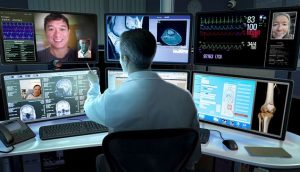Nursing, often described as both an art and a science, encompasses a vast landscape of disciplines. Each of those fields has its unique focus and contribution to patient care. From the front lines of the emergency room to the specialized care units, community health initiatives and research laboratories, nurses play an indispensable role in every aspect of the healthcare system.
The following article delves into the diverse world of nursing disciplines, highlighting their specific areas of expertise and the impact they have on patients' lives. This guide can be an invaluable resource to learners, educators, practitioners, policy makers and other stakeholders seeking to gain more insights into nursing.
The Importance of Nursing

The role of nursing is multifaceted and essential to the healthcare system. It extends far beyond simply following doctors' orders. Nurses are the backbone of patient care, providing a holistic approach that encompasses physical, emotional, and psychological well-being.
Here's a breakdown of the core roles of a nurse:
- Direct Patient Care:
- Assessment: Nurses are often the first point of contact for patients. They conduct thorough assessments, gathering vital signs, medical history, and evaluating symptoms to understand the patient's overall health status.
- Planning & Implementing Care: Based on assessments and in collaboration with other healthcare professionals, nurses develop and implement individualized care plans. This includes administering medication, providing wound care, monitoring vital signs, and assisting with daily living activities.
- Evaluation: Nurses continuously monitor patients' responses to treatment and adjust care plans accordingly. They identify potential complications, advocate for necessary interventions, and communicate changes in a patient's condition to the healthcare team.
- Patient Education and Advocacy:
- Educators: Nurses play a crucial role in educating patients and their families about their health conditions, treatment plans, medications, and self-care strategies. They empower patients to actively participate in their own health management.
- Advocates: Nurses are staunch advocates for their patients, ensuring their voices are heard and their needs are met. They act as liaisons between patients, families, and other healthcare providers, facilitating communication and navigating complex medical situations.
- Collaboration and Teamwork:
- Teamwork: Nursing is a collaborative profession. Nurses work seamlessly with physicians, pharmacists, therapists, social workers, and other healthcare professionals to provide comprehensive patient care.
- Leadership & Management: Many nurses take on leadership roles within healthcare settings, managing units, overseeing staff, and implementing quality improvement initiatives.
- Research and Innovation:
- Evidence-Based Practice: Nurses are at the forefront of integrating research findings into clinical practice, ensuring that patients receive the most up-to-date and effective care possible.
- Advancing the Profession: Nurse researchers conduct studies, analyze data, and contribute to the growing body of nursing knowledge, shaping the future of healthcare delivery.
In essence, the role of nursing is to:
- Provide safe, compassionate, and patient-centered care.
- Promote health and well-being.
- Empower patients and their families.
- Advocate for equitable and accessible healthcare.
- Drive innovation and excellence in the healthcare system.
The dedication, empathy, and expertise of nurses are fundamental to providing high-quality healthcare and improving patient outcomes. Educational websites such as
nursingpapers.us.com provide useful resources that can help you to gain a better understanding of the nursing profession and the important role it plays in society.
The Key Nursing Disciplines and Specialties

Nursing is a broad field of study, with several disciplines and specialties. Knowing them is essential for students who are planning to pursue careers in nursing. Understanding the different nursing disciplines can also help patients, care givers and even the general public to know where to turn to whenever they need medical assistance. The following are the main nursing disciplines and specialties.
- Registered Nurses (RNs): The Cornerstone of Care
Registered Nurses form the backbone of the nursing profession.Their scope of practice is diverse and demanding, requiring a unique blend of clinical expertise, critical thinking, and interpersonal skills.
RNs are responsible for a wide range of tasks, including:
- Assessment: Gathering patient information through physical examinations, interviews, and reviewing medical history.
- Diagnosis: Identifying patient problems and developing care plans in collaboration with physicians and other healthcare professionals.
- Planning and Implementation: Administering medications, providing wound care, monitoring vital signs, and implementing interventions outlined in the care plan.
- Evaluation: Assessing the effectiveness of treatments and making adjustments as needed.
- Patient Education: Educating patients and families about their health conditions, treatment plans, and self-care strategies.
- Advocacy: Acting as a liaison between patients, families, and other healthcare providers, advocating for the patient's best interests.
RNs work in a variety of settings, including hospitals, clinics, private practices, schools, and patients' homes. They are the first point of contact for many patients and play a vital role in coordinating and delivering holistic care. Read more about RNs here.
- Advanced Practice Registered Nurses (APRNs): Expanding the Scope
Building upon the foundation of registered nursing, Advanced Practice Registered Nurses (APRNs) pursue further education and specialization, enabling them to provide a higher level of care. They are highly educated and skilled nurses with at least a Master's Degree in nursing. There are four primary types of APRNs:
- Nurse Practitioners (NPs): NPs hold master's or doctoral degrees and are licensed to provide a wide range of primary and specialty healthcare services, including diagnosing and treating illnesses, ordering and interpreting diagnostic tests, and prescribing medications. They often serve as primary care providers, especially in underserved areas.
- Certified Nurse Midwives (CNMs): CNMs are experts in women's health, focusing on pregnancy, childbirth, and postpartum care. They provide prenatal care, deliver babies, offer family planning services, and manage gynecological needs.
- Clinical Nurse Specialists (CNSs): CNSs are highly specialized in a particular area of nursing practice, such as critical care, oncology, or pediatrics. They act as expert clinicians, educators, researchers, and consultants within their chosen specialty.
- Certified Registered Nurse Anesthetists (CRNAs): CRNAs administer anesthesia and provide pain management for patients undergoing surgery or other procedures. They work independently or in collaboration with anesthesiologists.
APRNs play a crucial role in expanding access to care, particularly in primary care settings and undeserved areas.
Here's a breakdown of the core roles and responsibilities of APRNs:
- Providing Primary and Specialty Care:
- Diagnosis and Treatment: APRNs are authorized to diagnose and treat illnesses, order and interpret diagnostic tests, and prescribe medications (including controlled substances, depending on state regulations).
- Patient Management: They develop and manage comprehensive care plans for patients with acute and chronic conditions, focusing on disease prevention, health promotion, and overall well-being.
- Patient Education and Counseling:
- Health Literacy: APRNs prioritize patient education, providing clear explanations of diagnoses, treatment options, and potential side effects. They empower patients to actively participate in their own healthcare decisions.
- Disease Management: APRNs provide specialized education and support for patients managing chronic conditions, such as diabetes, heart disease, or asthma.
- Collaboration and Leadership:
- Interprofessional Teams: APRNs collaborate closely with physicians, pharmacists, therapists, and other healthcare professionals to ensure coordinated and comprehensive patient care.
- Leadership Roles: They often take on leadership roles within healthcare organizations, leading quality improvement initiatives, developing clinical protocols, and mentoring other nurses.
Specialized Nursing Disciplines: Meeting Unique Needs
Within the broad categories of RNs and APRNs, a multitude of specialized nursing disciplines cater to specific patient populations or healthcare settings. Some prominent examples include:
- Critical Care Nursing: Caring for critically ill patients in intensive care units (ICUs). This demanding field requires specialized training in advanced life support, hemodynamic monitoring, and the management of complex medical conditions.
- Emergency Nursing: Providing immediate care to patients experiencing life-threatening injuries or illnesses in the fast-paced environment of the emergency department.
- Oncology Nursing: Delivering specialized care to patients with cancer, including administering chemotherapy, managing side effects, and providing emotional support.
- Pediatric Nursing: Focusing on the unique healthcare needs of infants, children, and adolescents, from well-child visits to complex medical conditions.
- Geriatric Nursing: Providing care for older adults, addressing age-related health concerns, promoting independence, and improving quality of life.
- Psychiatric-Mental Health Nursing: Caring for individuals with mental health disorders, providing therapy, administering medications, and promoting mental well-being.
- Community Health Nursing: Promoting public health and preventing disease within communities through education, outreach programs, and home visits.
- School Nursing: Providing healthcare services to students in schools, including managing acute illnesses, administering medications, and promoting healthy habits.
The Future of Care: Nursing in a Changing World

Although the nursing profession is built on compassion and expertise, the landscape keeps changing due to various forces. As healthcare evolves, so too does the role of the nurse. Here's a glimpse into the future of nursing:
- Tech-Savvy Care: Telehealth and remote patient monitoring will become increasingly commonplace, expanding access to care and demanding tech-savvy nurses. Imagine virtual home visits and AI-powered diagnostics supporting nurses in delivering personalized care.
- Data-Driven Decisions: Nurses will harness the power of big data and predictive analytics to identify high-risk patients, personalize interventions, and improve overall healthcare outcomes.
- Genomics at the Forefront: Understanding the influence of genetics on health will become standard practice. Nurses will be instrumental in educating patients about genetic risks and tailoring care based on individual genomic profiles.
- Leading the Charge: With an increased focus on preventative care and population health management, nurses will play a pivotal role in community outreach, health education, and advocating for policies that promote well-being.
The future of nursing promises exciting advancements, with technology and innovation empowering nurses to deliver even more effective, personalized, and accessible care.
The diverse array of nursing disciplines highlights the multifaceted nature of this vital profession. Whether providing direct patient care, conducting research, educating future nurses, or advocating for policy changes, nurses play a crucial role in shaping the future of healthcare. Their dedication, compassion, and commitment to excellence are essential for delivering high-quality care and improving patient outcomes. As the healthcare landscape continues to evolve, nurses will undoubtedly remain at the forefront, adapting to new challenges and driving innovation in the pursuit of optimal health and well-being for all.
Get Professional Help with Nursing Paper Writing
The above post is good example of the common nursing topics that students tackle in school. At
academiascholars, we provide professional help with nursing paper writing in more than 6 nursing disciplines and specialties. Our services cover nursing topic suggestion, paper writing, proof reading and editing, plagiarism check. You can also read more
nursing papers here for your inspiration.
 The role of nursing is multifaceted and essential to the healthcare system. It extends far beyond simply following doctors' orders. Nurses are the backbone of patient care, providing a holistic approach that encompasses physical, emotional, and psychological well-being.
Here's a breakdown of the core roles of a nurse:
The role of nursing is multifaceted and essential to the healthcare system. It extends far beyond simply following doctors' orders. Nurses are the backbone of patient care, providing a holistic approach that encompasses physical, emotional, and psychological well-being.
Here's a breakdown of the core roles of a nurse:
 Nursing is a broad field of study, with several disciplines and specialties. Knowing them is essential for students who are planning to pursue careers in nursing. Understanding the different nursing disciplines can also help patients, care givers and even the general public to know where to turn to whenever they need medical assistance. The following are the main nursing disciplines and specialties.
Nursing is a broad field of study, with several disciplines and specialties. Knowing them is essential for students who are planning to pursue careers in nursing. Understanding the different nursing disciplines can also help patients, care givers and even the general public to know where to turn to whenever they need medical assistance. The following are the main nursing disciplines and specialties.
 Although the nursing profession is built on compassion and expertise, the landscape keeps changing due to various forces. As healthcare evolves, so too does the role of the nurse. Here's a glimpse into the future of nursing:
Although the nursing profession is built on compassion and expertise, the landscape keeps changing due to various forces. As healthcare evolves, so too does the role of the nurse. Here's a glimpse into the future of nursing: